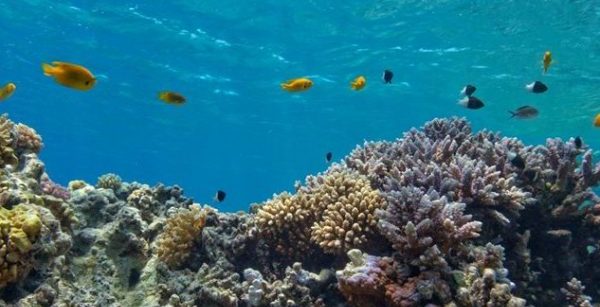The US Coast Guard provided recommended measures to mitigate the potential factors that some indications suggest may be contributing to the spread of Stony Coral Tissue Loss Disease (SCTLD) throughout the Caribbean. One such factor may be the potential transfer of pathogens in ballast water.
USCG and the Environmental Protection Agency (EPA), as participants of the Caribbean Coral Reef Partnership, were recently provided information regarding the rapid spread of SCTLD throughout the Caribbean, a lethal disease that rapidly destroys the soft tissue of many different species of coral.
The disease first appeared off the coast of Miami-Dade County, Florida, in September 2014. Now nearly half of Florida’s 45 species of hard coral are affected by the disease, including many reef-building types.
Once afflicted, the disease progresses rapidly, killing corals within weeks or months. It is estimated to have led to the death of millions of corals since 2014.
The causative agent of SCTLD has not yet been identified. Recent work indicates that co-infection of a bacteria and a virus is a possibility.
In this regard, the USCG Office of Operating and Environmental Standards published Marine Safety Information Bulletin 007-19, “Ballast Water Best Management Practices to Reduce the Likelihood of Transporting Pathogens That May Spread Stony Coral Tissue Loss Disease.“
The bulletin seeks to ensure that the maritime industry has the information it needs to mitigate ballast water as a potential contributing factor, following request by the National Oceanic and Atmospheric Administration (NOAA).
-Accordingly, vessel representatives are reminded of the following mandatory management practices associated with the discharge of ballast water (BW) from vessels required to conduct a Ballast Water Exchange (BWE) under US Regulations:
- A BWE conducted for the purpose of complying with US BW management requirements must be done outside of 200 nautical miles from any shore in accordance with 33 CFR 151.2025. This is simply a reminder of an existing requirement. USCG and EPA requirements specify that certain ships conduct regulatory BWE beyond 200 nm of any shore prior to discharge of BW in US waters. Additionally, ships that must also comply with the BWM Convention are directed to conduct BWE at least 50 nm from shore and in waters at least 200 m in depth. Based on information the Coast Guard has received, it appears some ships may be conducting regulatory BWE at closer distances, including within 12 nm of shore.
- Operators required to manage their vessel’s ballast water in accordance with 33 CFR 151.2025 by using methods other than BWE shall not discharge unmanaged BW within 12 nm of shore. This also is a reminder of an existing requirement. Under Coast Guard regulations, once a vessel has passed its compliance date under 33 CFR 151.2035, or an extended compliance date under 33 CFR 151.2036, discharge of unmanaged BW is not permitted within US waters (12 nm of shore).
-Additionally, vessel representatives are strongly encouraged to adopt the following list of voluntary best management practices (listed in order of priority):
- If a vessel has not reached its BW discharge standard compliance date, but has a type approved BWMS or an accepted Alternate Management System, use the system and verify it is functioning properly. An approved and appropriately operated ballast water treatment system is likely to be more effective in preventing the transport of pathogenic organisms than a BWE conducted within 200 nm of adjacent shoreline
- If the vessel does not have a BWMS and the planned voyage does not go 200 nm from shore; voluntarily divert to 200 nm and conduct a BWE, or for vessels that don’t voyage out to 200 nm, voluntarily conduct a BWE at least 50 nm from shore and in waters of at least 200 m (109 fathoms) depth in alignment with the Convention for the Protection and Development of the Marine Environment of the Wider Caribbean Area (Cartagena Convention). To reduce the possibility of introducing coral disease pathogen(s), vessels that can use BWE to meet BWM requirements are encouraged to conduct BWE as far from shore as possible to reduce the probability of transporting SCTLD. This recommendation is consistent with the “Guidelines for ballast water exchange and sediment management in the Wider Caribbean Region Area” (MEPC 73/INF.3).
- If discharging unmanaged (unexchanged or untreated) BW outside US waters (beyond 12 nm of shore), prior to entry into port, discharge beyond 50 nm of any shore and in water depths of 200 m or greater. If vessels decide to discharge unmanaged, or insufficiently managed, BW outside of 12 nm and, consequently, beyond the jurisdiction of the Coast Guard BWM regulations, the discharge should be conducted as far from coral reefs as possible, regardless of whether the reef is inside or outside of 12 nm from shore. Note that vessels should ensure that the discharge of unmanaged BW outside of 12 nm of the United States is safe and acceptable to the flag State under the BWM Convention.
- When safe and practicable, minimize BW uptake and do not conduct partial BWE within 50 nm. Partial exchanges, such as “mud-management” exchanges, are typically conducted as soon as a vessel reaches relatively clear offshore water to flush empty tanks or minimize settlement of suspended sediment in recently loaded tanks. This partial exchange should not be conducted within 50 nm of shore.
The following video, courtesy of Woods Hole Oceanographic Institution (WHOI), was taken during a survey the day after a team of researchers discovered a coral disease outbreak on February 1, 2019 at Flat Cay reef on St. Thomas, US Virgin Islands.
The white that you see on the corals are areas where the coral tissue has died:































































